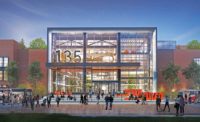As private developers struggle through the global economic crisis, builders and designers continue to tap publicly funded projects to keep pipelines full. Although infrastructure has garnered a large portion of the available government-backed work worldwide, institutional opportunities in education, health-care and government facilities have kept the base-building divisions of many firms active.

Johan Karlström, president and CEO of Stockholm-based Skanska, says he expects public spending will continue to fill some of the void left by the absence of private work, but recognizes the trend can’t continue for long.
“If the politicians stop the subsidies, then there will be a double-dip recession,” he says. “I expect the public side won’t slow down until we see the general economy start to pick up. [Governments] can’t afford to continue like this.”
One litmus test could come in June, when the United Kingdom will hold its next general election, Karlström says. “In the U.K., public spending will go down regardless of which side is the winner,” he says.
For now, considerable institutional work remains in the U.K. The U.K.’s hospital building program has been a solid source of work for years, but as many of the major acute-care hospitals have been completed, volume has dropped off. In their place, plans to modernize and replace schools are expected to keep large firms busy.
In April, Skanska won contracts with a combined value of $165 million for the construction of six schools in Bristol, England. In May, London-based Balfour Beatty reached financial closure for the $326-million Southwark Schools for the Future secondary program, which provides capital improvement funds for 12 schools. In October, Balfour Beatty was appointed preferred bidder for a $735-million public-private partnership to build or remodel 24 schools and nine other facilities in Blackburn, Darwen and Bolton.
Andrew McNaughton, Balfour Beatty COO, says despite an otherwise difficult financial market, many banks see PPP projects as relatively low-risk investments and governments see it as a solution to a growing problem. “The dilemma [the government] has is, there’s a public program to deliver and a balance of finances to deliver as well,” he says. “Even if some feel this is not the best solution, it’s a good solution in a tough market.”
In France, Rueil-Malmaison-based VINCI is part of a consortium selected by the French Ministry of Defense to finance, design, build and maintain the new $150-million campus of Ecole Nationale Supérieure de Techniques Avancées.
Perhaps the most visible victim of the economic downturn has been the Middle East. Once ripe with opportunities, many projects dried up when financing tightened. Still, numerous projects continue to move forward, and new megaprojects are being awarded. Herbert Lütkestratkötter, CEO of Essen, Germany-based Hochtief, says Qatar and Abu Dhabi, which took more conservative approaches to development than Dubai, continue to develop at a steady pace. Even in Dubai, projects are relatively active. “Dubai has seen a bubble. Nevertheless, the volume of ongoing projects is remarkable,” he says.
Although much of the work is not institutional, public funds are helping fuel many projects. In April, Hochtief announced a $2-billion deal—the largest single contract in the firm’s history—to build a more than 8-kilometer-long building complex in Doha. Dubbed Barwa Commercial Avenue, the project will include retail, office and residential units, with completion planned for mid-2012. The state of Qatar is a 45% partner.
Joe Brown, chief executive of planning, design and development at Los Angeles-based AECOM, says with Dubai taking a step back, Abu Dhabi, Qatar and Saudi Arabia are stronger markets than ever. “It’s not so much market share grown as market share stolen,” he says. “They realize Dubai can’t compete for investment right now.”
With the shift in available opportunities, Brown says those firms that hope to survive will need to be nimble. “This is a Darwinian moment,” he says. “Those who can adapt their strengths will survive. If not, you won’t make it.”




